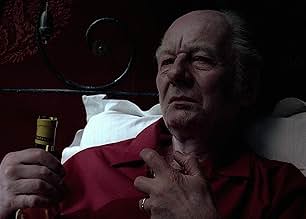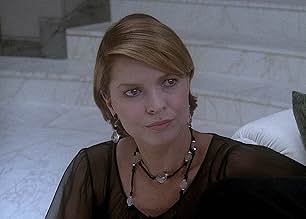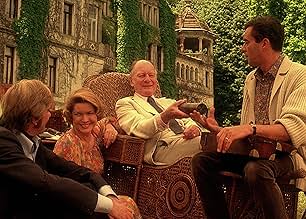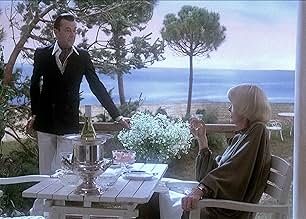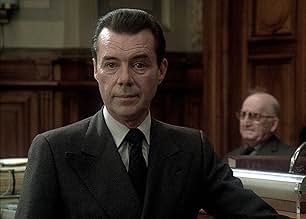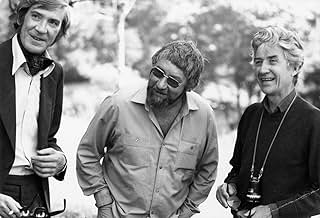IMDb RATING
7.4/10
3.7K
YOUR RATING
A dying writer bases his last book on his own perception of his family.A dying writer bases his last book on his own perception of his family.A dying writer bases his last book on his own perception of his family.
- Awards
- 11 wins & 2 nominations total
Denis Lawson
- Dave Woodford
- (as Dennis Lawson)
- Director
- Writer
- All cast & crew
- Production, box office & more at IMDbPro
Featured reviews
Renais "Providence" has all the hallmarks of cinema at its artistic best. Every component of film making is expertly handled. David Mercer's literary screenplay is a joy to listen to, especially when delivered by the likes of Dirk Bogarde and of course the legendary John Gielgud. The visuals are haunting and perfectly shot with detailed attention to set and costume. Miklos Rosza's soundtrack is in total accordance with the work as a whole, never intrusive, while adding to the rich tapestry that is "Providence". Renais too has assembled a wonderful if somewhat odd cast, which suitably serve this somewhat odd film.
Gielgud plays a dying author whose mind is racing with fantasies peopled by members of his family. His character Clive Langham is depicted as a ribald, sensual, womanizer. Yet his fantasies, making up the bulk of the film, are curiously cold and stark. They are played in bleak settings with an ever present sense of impending catastrophe, though remaining totally devoid of emotion. These imaginings are at completely at odds with their creator. The extreme incongruousness of these fantasies with the character to whom they belong, remains a mystery. This detracts much in the way of emotional impact which is very much lacking in the film, whether intentional or not. The elimination of emotion leaves "Providence" a cold, wonderfully intelligent exercise in the art of film making.
Renais has assembled an intriguing cast headed by the superb Gielgud. Dirk Bogarde whose performances have often been tinged with a cold, sauve superciliousness brings this unpleasant quality to an unparalleled level of extremity. Even the usually over emoting Ellen Burstyn delivers a restrained performance. Elaine Stritch has to be the oddest choice for the role being so contrary to her well known persona. Never has a more unlikely coupling been presented than Stitch and Bogarde as lovers. Yet in this emotionless void, even that becomes acceptable.
"Providence" is a highly unusual, important film and shouldn't be missed by the discerning film enthusiast. Yet despite the wealth of cinematic craft on display it remains an unsatisfying experience.
Gielgud plays a dying author whose mind is racing with fantasies peopled by members of his family. His character Clive Langham is depicted as a ribald, sensual, womanizer. Yet his fantasies, making up the bulk of the film, are curiously cold and stark. They are played in bleak settings with an ever present sense of impending catastrophe, though remaining totally devoid of emotion. These imaginings are at completely at odds with their creator. The extreme incongruousness of these fantasies with the character to whom they belong, remains a mystery. This detracts much in the way of emotional impact which is very much lacking in the film, whether intentional or not. The elimination of emotion leaves "Providence" a cold, wonderfully intelligent exercise in the art of film making.
Renais has assembled an intriguing cast headed by the superb Gielgud. Dirk Bogarde whose performances have often been tinged with a cold, sauve superciliousness brings this unpleasant quality to an unparalleled level of extremity. Even the usually over emoting Ellen Burstyn delivers a restrained performance. Elaine Stritch has to be the oddest choice for the role being so contrary to her well known persona. Never has a more unlikely coupling been presented than Stitch and Bogarde as lovers. Yet in this emotionless void, even that becomes acceptable.
"Providence" is a highly unusual, important film and shouldn't be missed by the discerning film enthusiast. Yet despite the wealth of cinematic craft on display it remains an unsatisfying experience.
Not enough can truly be said for this film. Equally, nothing can change people's reaction to it; it is an art piece which separates people. Early reviews from the period of its release seem unfriendly at least. Many reviewers found the film pretentious and constructionally difficult. Many claimed it attempted more mystery than it had a right to. I feel this was a film ahead of its time, and any pomposity in the film comes not from its center, but from its central character, Clive Langham (John Gielgud). This, more than almost any film of the 20th century, is a film which rewards the viewer for multiple viewings. If you are often accused of being obsessive, overly-analytic or just plain artsy, this film will tickle you in some very personal places. The message I will refuse to comment on, though it is very deeply personal to me, and, I would say, to all writers. But the "crux of the biscuit," if you will, is this: examine the title in relation to the film.
Since so many good comments have been written here, mostly on the psychological side of the characters, and they are all excellent, I decided to comment upon a very present entity and that is WINE.
Notice that, until the last scene, everybody drinks white, mostly CHABLIS, an acid one. But on that last scene Resnais shifts to RED. It is no accident, it has in my modest opinion, a way that illustrates a very fundamental change in the feelings that occurred in that lunch.
Criticism and over-analysis, ever present till that event, give way to peaceful acceptance of the characters by the father, Without hypocrite sensibility, that he refuses, but with warmth and tolerance.
Well, I do believe, by some 55 years of experience, that white wine (dry, European style) makes one restless and sometimes bitter.
Red wine makes one more relaxed and happy.
I do not know which kind of wine Resnais prefers, but since he is a Breton I would not be surprised, that it is WHITE. Maybe that is the reason why His movies are so difficult to decode. They are also some of the most magnificent works of cinematic art..
Notice that, until the last scene, everybody drinks white, mostly CHABLIS, an acid one. But on that last scene Resnais shifts to RED. It is no accident, it has in my modest opinion, a way that illustrates a very fundamental change in the feelings that occurred in that lunch.
Criticism and over-analysis, ever present till that event, give way to peaceful acceptance of the characters by the father, Without hypocrite sensibility, that he refuses, but with warmth and tolerance.
Well, I do believe, by some 55 years of experience, that white wine (dry, European style) makes one restless and sometimes bitter.
Red wine makes one more relaxed and happy.
I do not know which kind of wine Resnais prefers, but since he is a Breton I would not be surprised, that it is WHITE. Maybe that is the reason why His movies are so difficult to decode. They are also some of the most magnificent works of cinematic art..
I saw this film at release and have seen it several times since and this motion picture still holds up, a seemingly complex story that unravels steadily
throughout the film. Resnais uses every dramatic device available to tell what becomes a moving and tender portrait, not least visual puns, particularly a
sequence where Dirk Bogarde drives across "town", in which a very simple
montage predates digital morphing as seen in current commercials, smoothly
linked through the activity of the character. All good Resnais films include an examination of the minds of his characters and this is a superb twist-and-turn reality that involves us completely. The acting of course is flawless and includes a wonderful pairing of the great Elaine Stritch and Ellen Burstyn. David Warner, a personal favorite, is actually given the opportunity to act and steps up to the plate and compliments Dirk Bogarde's cool and wooden portrait. I regularly look for this release on DVD and am consistently disappointed. Could someone
publish it soon?
throughout the film. Resnais uses every dramatic device available to tell what becomes a moving and tender portrait, not least visual puns, particularly a
sequence where Dirk Bogarde drives across "town", in which a very simple
montage predates digital morphing as seen in current commercials, smoothly
linked through the activity of the character. All good Resnais films include an examination of the minds of his characters and this is a superb twist-and-turn reality that involves us completely. The acting of course is flawless and includes a wonderful pairing of the great Elaine Stritch and Ellen Burstyn. David Warner, a personal favorite, is actually given the opportunity to act and steps up to the plate and compliments Dirk Bogarde's cool and wooden portrait. I regularly look for this release on DVD and am consistently disappointed. Could someone
publish it soon?
10flasuss
In Providence, his only film in English Language, Resnais again approaches the most recurrent subject in his career: the memory. Here, he explores how one's feelings can affect it: the life of the writer reflects directly on his view of his son and the wife of this one, and their respective (supposed) lovers, which actually are a representation of the writer's alienation, guilt and self-depreciation. It shows how memory can be more painful than any pain of the flesh, and even worse than reality itself. Like everything i've seen from Resnais so far (Night and Fog, Hiroshima Mon Amour, Mon Oncle D'Amérique and one of my favorite films, Last Year in Marienbad), this one is a very deep and original masterpiece.
Did you know
- TriviaSir John Gielgud, who spent most of his career on the stage, considered this movie and the television mini-series Brideshead Revisited (1981) to be his only two screen appearances of which he was genuinely proud.
- Quotes
Clive Langham: Don't you think to have only one bastard after sixty years of action is almost tantamount to self denial?
- Crazy creditsThe National Philharmonic Orchestra is misspelled as National Philarmonic Orchestra in the opening credits.
- ConnectionsFeatured in Zomergasten: Episode #7.4 (1994)
Details
- Runtime
- 1h 44m(104 min)
- Color
- Aspect ratio
- 1.78 : 1(original ratio)
Contribute to this page
Suggest an edit or add missing content

